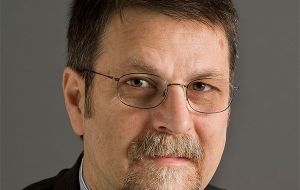MercoPress. South Atlantic News Agency
WB backs selective use of capital controls when faced with massive inflows
 WB Vice-president for Latin America and the Caribbean Hasan Tuluy said trade protectionism must be avoided
WB Vice-president for Latin America and the Caribbean Hasan Tuluy said trade protectionism must be avoided The World Bank’s new Latin America chief backed selective use of capital controls when inflows were creating asset bubbles or distorting foreign exchange markets. Hasan Tuluy, the Bank’s new vice-president for Latin America and the Caribbean, said while trade protectionism should be avoided, there was space for macro prudential measures.
“We would seek to avoid trade restrictions as they affect the consumer adversely and increase uncertainties for producers and prove difficult to roll back,” he said.
There are a series of other steps that should be used before protectionism, he said. These included fiscal policy measures, where there is space to do so, monetary policies, and selective controls on capital flows.
Tuluy believes that selected capital controls can be beneficial as significant inflows had potentially damaging effects on foreign exchange and may blow asset bubbles.
Today, these two are legitimate concerns for emerging markets, which are seeing significant portfolio flows thanks to low developed world interest rates, which are needed, especially in the Euro-zone.
For there to be sustained, dynamic growth that brings in technology, governments globally need to reduce uncertainty in legislation, he said. Extra liquidity looking for strong returns invariably ends up in developing countries, such as Turkey, said Tuluy – himself a Turkish national.
“[Capital] controls are a policy tool that allows you to manage flows in a way that that does not have deleterious effects on economies,” he said but declined to discuss the specific case of Brazil.
In the medium- to long-term, the challenge for the region is to build productivity and competitiveness and create predictable sets of policies that allow individuals invest, innovate and enhance technology transfer and skills upgrading, he said.
The World Bank must give ownership of programs to governments while involving partners from a broad spectrum, bringing in research complexes and universities.
He wants to further cooperation between his Bank and the IDB. “We do not want a competitive environment. We need to change the mindset including in our communications,” he said.
Going forward, Latin countries need to focus on the productivity and competitiveness agenda, he said.
They have done very well thanks to commodities and some productivity growth in areas such as consumer markets. “The next frontier includes plugging infrastructure and logistics gaps and building global value chains to unlock value and build on the competitive edge provided by commodities,” he said.
Latin countries need to move to more diverse economies and exports: that is the challenge of the next ten years. Green and sustainable growth with new technologies offers opportunities for Latin America to leap ahead.




Top Comments
Disclaimer & comment rules-

-

-

Read all commentsRG's are after more money from the WB:
Mar 20th, 2012 - 09:18 am 0http://www.buenosairesherald.com/article/95884/world-bank-considering-additional--billion-credit-for-argentina
I think the US and UK are trying to stop this from happening. I hope they succeed.
This is how Cristina Kirchner the most corrupt president in all of South America and her cronies get into power:
Mar 20th, 2012 - 10:19 am 0www.youtube.com/watch?v=UyPC0SD0PGw
@2
Mar 20th, 2012 - 11:01 am 0Absolutely disgraceful. So much for “democracy”.
Commenting for this story is now closed.
If you have a Facebook account, become a fan and comment on our Facebook Page!